So often your lumps, bumps, rashes, and red spots are harmless. Occasionally, they're a sign of something far more serious. Here's how to tell the difference.
42 Strange Symptoms That Can Signal a Serious Disease
Health symptoms you shouldn’t ignore
Sometimes strange symptoms are harmless, but occasionally they can be the sign of a more serious problem. Whether it’s an unexplained rash or an unusual swelling, it’s not a bad idea to get it checked out. From lumps and bumps to rashes and spots, here’s a look at health symptoms you shouldn’t ignore.

You have dark patches on your neck or armpit
If you have dark patches on your skin that feel soft and look almost like dirt—but can’t be washed away—you may be at risk for or have type 2 diabetes. The skin discoloration is called acanthosis nigricans and it “almost looks like dirt but has a velvety feel,” says Todd Jeremy Sontag, DO, a family medicine specialist with Orlando Health Physician Associates in Orlando, Florida.
He commonly sees it on the back of the neck or in the armpit, but they can also show up on other creases in the body, like the groin. The patches may be more visible on people who have darker skin in general, and are much more likely to be seen in a patient who is Black or Latino.
The patches are often a sign that you have too much insulin in your blood, and that can be due to type 2 diabetes, prediabetes, or insulin resistance, which is the underlying cause of type 2 diabetes. “Patients will come in asking about this rash they can’t get rid of,” he notes. A doctor will order blood tests to check blood sugar levels to make the diagnosis. (Here are 10 more silent signs of diabetes.)
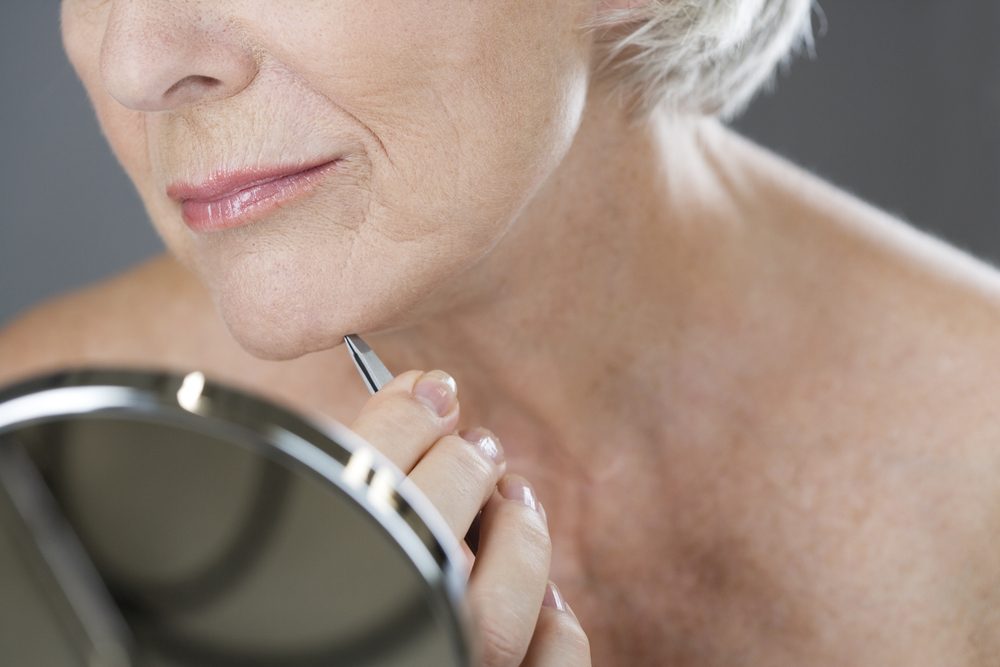
You’re a woman and you’re sprouting chin hairs
This can be a sign of polycystic ovary syndrome, notes Dr. Sontag. “Usually you see just a few hairs, but they’re dark and coarse like a man’s beard,” he notes. The hormonal imbalance may also affect your period, and can thus impact your fertility. A look at your medical history and symptoms can point your doctor in the right direction.
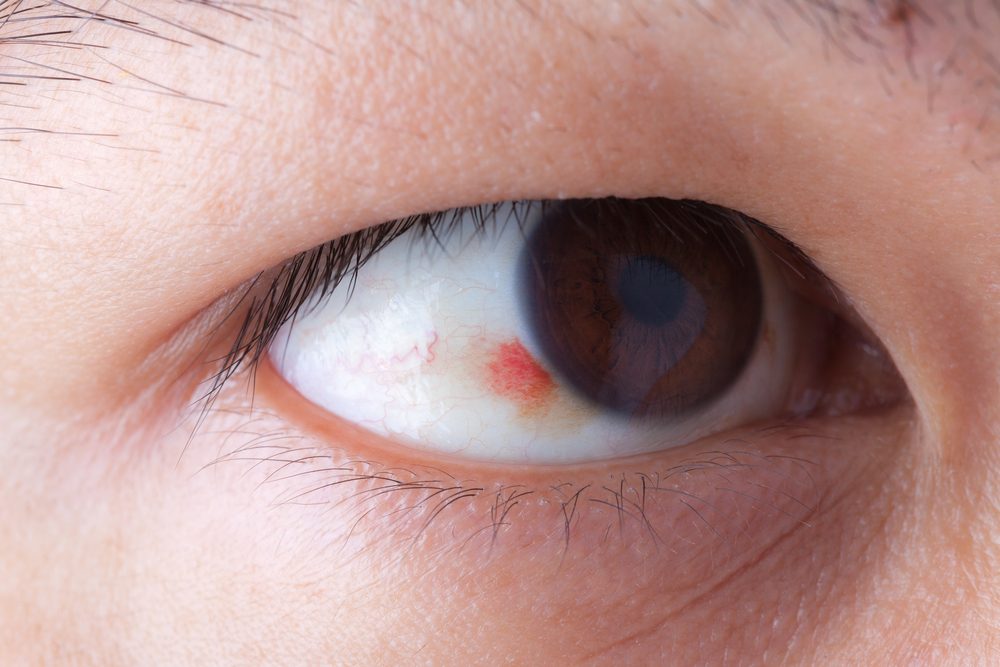
You see blood spots in your eyes
The condition is known as a subconjunctival hemorrhage, and the American Heart Association notes that this is more common with people who have high blood pressure or diabetes. While these conditions don’t cause the spots, the two are linked. (These are 6 shocking diseases eye doctors can find first.)
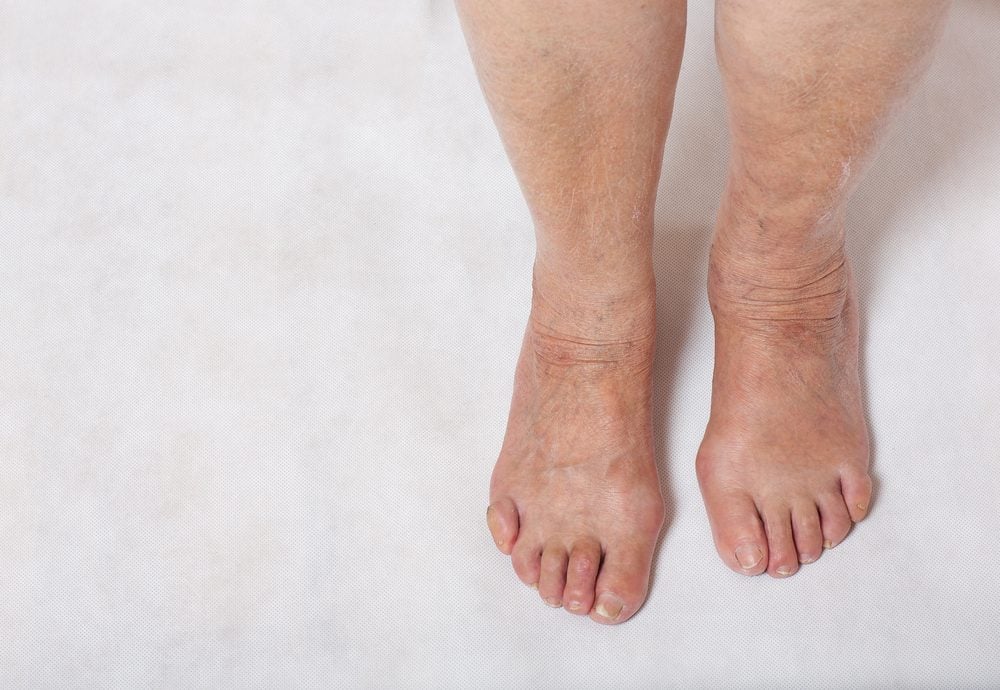
Your big toe is swollen
You don’t remember stubbing it—and it’s not like you’d forget. You could be looking at an early symptom of gout, which is not only painful but can signal risk for chronic diseases like high blood pressure and kidney disease, according to the Arthritis Foundation. A medical history plus examination at the MD office can diagnose it. (Here’s why stubbing your toe hurts so much.)

You have a major hankering for ice
Occasionally, a patient will come see Dr. Sontag and say “all I want to do is eat ice all day,” he notes. That’s a sign of iron-deficiency anemia. You’ll need a blood workup, and your doc will want to figure out why you’re anemic—are you losing blood or not making enough? The answer will direct your care.

Your eyes are bulging
If this is something that seems new—in pictures from last year they look normal—it could be an overactive thyroid, says Dr. Sontag. You may also notice other symptoms like unexplained weight loss or irritability.
A thyroid blood test will ID the problem. Iodine treatment can slow your thyroid, and you can manage the issue with thyroid medications. However, Dr. Sontag notes that sometimes thyroid problems are self-limiting and resolve on its own.

You’ve gotten shorter
If you’re wondering how your jeans got longer, you could be witnessing one of the silent signs of osteoporosis. As your bones weaken, the vertebrae in your spine begin to compress and you start to lose height. If you’re 1.5 inches shorter than you were in your 20s, see your doctor.

Your urine is cloudy
When you pee, it should be clear and the color of light lemonade. If it’s darker yellow, you could be dehydrated; when it’s almost clear, you may be too hydrated. But if it’s cloudy or very dark, you could have a bladder stone that’s irritating the wall of your bladder, explains Stephanie J. Kielb, MD, associate professor of urology at Northwestern University Feinberg School of Medicine in Chicago. A physical exam and urinalysis can pinpoint the issue. These aren’t the only things your pee can reveal about your health.

Your feet feel like they’re attached to bricks
This could be a sign of rheumatoid arthritis (RA), a condition that hits women more than men and often strikes those between the ages of 20 and 40.
Fatigue (with or without joint pain) is another common symptom. Feeling stiff for four weeks warrants a trip to the MD to make sure everything is OK. (Here are 14 easy-to-ignore symptoms of arthritis.)

Your stools are black
No doubt it’s an alarming sight to have black stool, but there are a couple possibilities: One, you’re taking Pepto Bismol, which can turn them black. Two, the color can be a sign of digested blood, in which case your doctor may consider more serious issues like a stomach ulcer or GI cancer, according to the Colon Cancer Coalition. This isn’t the only sign of color cancer you may be missing.

Your stools are green
Yikes! Green poop certainly gets your attention. “This is often some sort of infection, like giardia or salmonella,” says Dr. Sontag. Your doctor will ask whether you’ve been abroad or camped or hiked recently and then consider testing. However, keep in mind that consuming any food containing blue color or another artificial food coloring can temporarily—and harmlessly—change the color of stool as well.

Your pee looks pink
Pink or red pee is a sign of blood in your urine. The most likely causes are a urinary tract or kidney infection, but it can also be present in later stages of kidney, bladder, or prostate cancer, notes the American Cancer Society. A urinalysis will be used, in part, to uncover the cause of the bleeding.

Your pee looks like cola
This should set off immediate alarm bells—particularly after an extreme workout or, say, running a marathon. It could be rhabdomyolysis. This disease occurs when muscle tissue breaks down, enters your bloodstream, and causes kidney damage. Here’s how to tell if it is rhabdomyolysis or something else.

Your mouth is burning
Appropriately called “burning mouth syndrome,” this may be due to damage to pain and taste nerves, according to the National Institute of Dental and Craniofacial Research. You’ll notice a painful burn or tingle in your mouth that’s frequent and sticks around for months. While there’s no test to diagnose this problem, your doctor will do a thorough workup to rule out other potential causes and may give you a prescription that can ease your discomfort.

Your leg hurts when you walk
Certainly, the first thing you want to think about would be: Did I injure myself on that hike I took last weekend or did I overdo it running more miles than I should? However, if the pain can’t be linked to an injury (or even if it can, but is accompanied by other symptoms), it could be a sign of deep vein thrombosis, which is a blood clot. It could also be caused by many other conditions. Only a doctor can tell for sure. It’s most likely not serious, but if it feels like your actual bone is hurting and it doesn’t go away, it may be sign of bone cancer (even if the pain comes and goes), according to the American Cancer Society. Keep in mind that this is very rare. Talk to your doctor about possible causes. (Learn the other secret signs that your bones are in trouble.)

You pee all the time
Yes, an increase in bathroom visits can be because of a urinary tract infection—though UTIs usually have that tell-tale burn. However, if you pee constantly and have an unquenchable thirst, you may be developing diabetes, notes Dr. Sontag. If you notice that you’re going much more frequently than before or are waking up throughout the night to relieve yourself, talk to your doctor. (Here are 9 medical reasons you may be peeing a lot.)

Your nipples are leaking
Not breastfeeding? Not having sex? Then it may be a condition called galactorrhea. It could be an underlying medical problem like a prolactinoma, a benign tumor on your pituitary gland, according to the American College of Obstetricians and Gynecologists. It could also be a breast cancer symptom, so be sure to have your doctor check it out.

You sit down to watch TV and immediately snooze
What seems like a commonplace event—it was a boring show anyway!—can mean something more: Most notably, sleep apnea. “I diagnose this a few times per week,” Dr. Sontag says. It’s more than an issue of disruptive snoring, he says: “Some patients hold their breath when they sleep for two minutes at a time. You’re not getting enough oxygen throughout the night,” he says. Don’t be afraid to talk to your doctor if you snore, feel unusually tired throughout the day, or your partner says you stop breathing at night. Snoring is no joke: Here are 13 signs sleep apnea could be killing you.

You wake up exhausted
This can be a sign of restless leg syndrome, or RLS. “You wake up tired because your body has never fully relaxed at night,” says Dr. Sontag. You may also have a strong urge to move your legs that gets worse when you’re sitting down. An evaluation of your medical history and symptoms can help point your MD in the right direction. These home remedies may also help your legs settle down.

You gained 20 pounds this month
If your weight has crept up slowly over time, you’ve most likely just been indulging a bit too often. But if your weight gain is sudden—like 20 pounds in a month—it may be due to a sluggish thyroid, says Dr. Sontag. After all, this butterfly-shaped gland at the base of your neck helps control your metabolism. Either way, your doctor may want to do a thyroid blood test to rule out the condition. Here are other sneaky signs of a thyroid disorder.
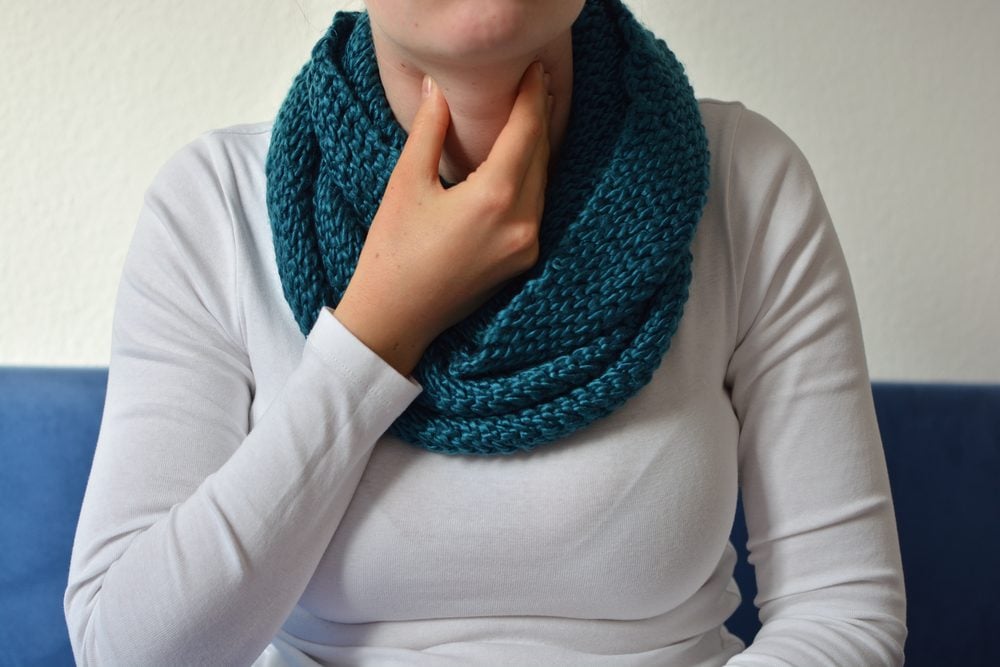
You swallow and something feels stuck
If you frequently feel like food is caught in your throat or find yourself changing the way you eat (like taking baby bites or avoiding certain bulky foods), this may be a sign of esophageal cancer, warns the American Cancer Society. A medical history and physical exam can tell your doctor if it’s a possibility. If so, they may order an imaging test to check for cancer. This common drugstore supplement may protect against esophageal cancer.

Your breast skin is nubby like an orange peel
Dimpled skin may be a sign of underlying breast cancer, says Dr. Sontag. “The orange peel look comes from swelling,” he adds and may be caused by inflammatory breast cancer. (The term is called “peau d’orange.”) A physical exam will be up first, and your doctor may examine breast tissue through a mammogram or ultrasound. Here are some more signs of breast cancer that don’t involve lumps.

You have a lump on your shoulder
Oddly enough, developing a lymph node on the top of your left clavicle can be a symptom of stomach cancer, says Dr. Sontag. (This is called Virchow’s node.) If you notice any other strange lumps or bumps that have recently appeared, call your doctor.

You have a lump around your belly button
A soft bulge around this area may be what’s called an umbilical hernia. Or it could be a lymph node called a Sister Mary Joseph nodule, a sign of underlying cancer, says Dr. Sontag. “Sometimes your body is doing what it should, and it’s OK to have lumps. But any time you notice anything unusual that’s changed, it’s always worth getting checked out,” he says. Here are some more silent hernia symptoms you might be ignoring.
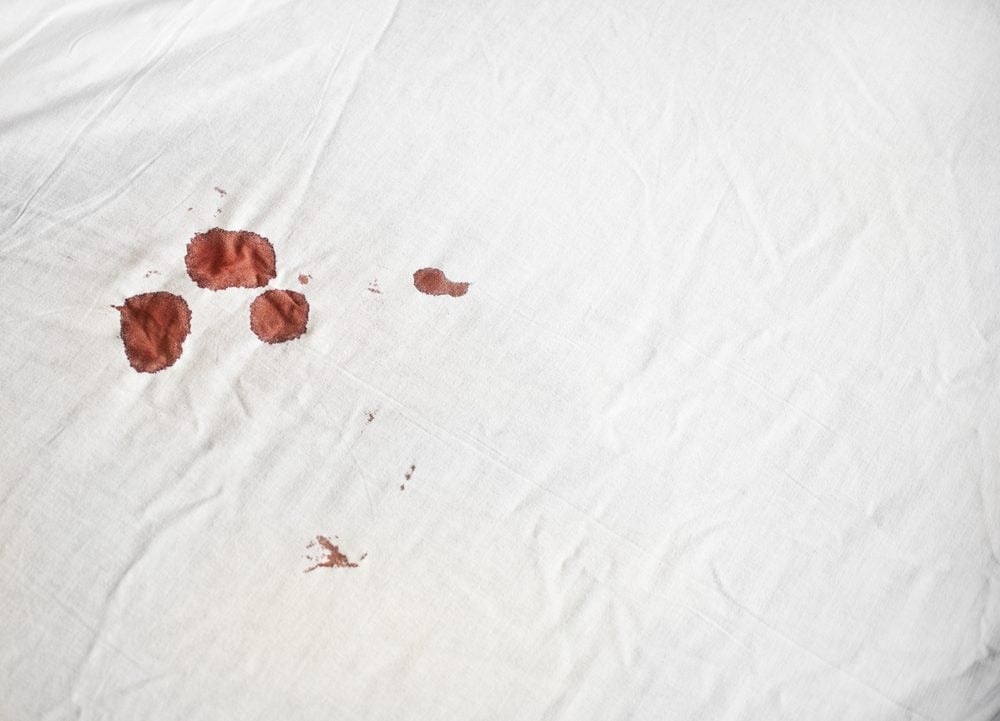
You’re bleeding after menopause
Light spotting isn’t anything to be worried about—in fact, it’s often normal. But period-like bleeding warrants a trip to your doctor who may be concerned about uterine cancer. The good news: If endometrial cancer is found early, the survival rate is very high—95 percent at 5 years, says the National Cancer Institute. Here are the other cancer symptoms women are likely to ignore.

You have a new spot on your skin
You know to look for changing moles that are irregular in shape, size, or color (learn the ABCDE‘s of skin cancer), but a new one that pops up should raise your suspicion even more. A 2017 study in the Journal of the American Academy of Dermatology found that 70 percent of melanomas arose from a new mole, while only 30 percent sprang from an existing one. Talk to your dermatologist about any new skin spots, and get an annual skin check to make sure your body-wide complexion is in the clear.

You’re really bloated
Beyond simply eating too much sushi (hello, soy sauce) or expecting your period any day now, abnormal and uncomfortable bloating can be a sign of ovarian cancer, warns the American Cancer Society. You may also pee more frequently, grapple with pelvic pain, or experience pain during sex. If your doctor suspects ovarian cancer, they will first run a physical exam to look for things like an enlarged ovary. If you often struggle with bloating, you might want to adopt these nine daily habits that can relieve the pressure.
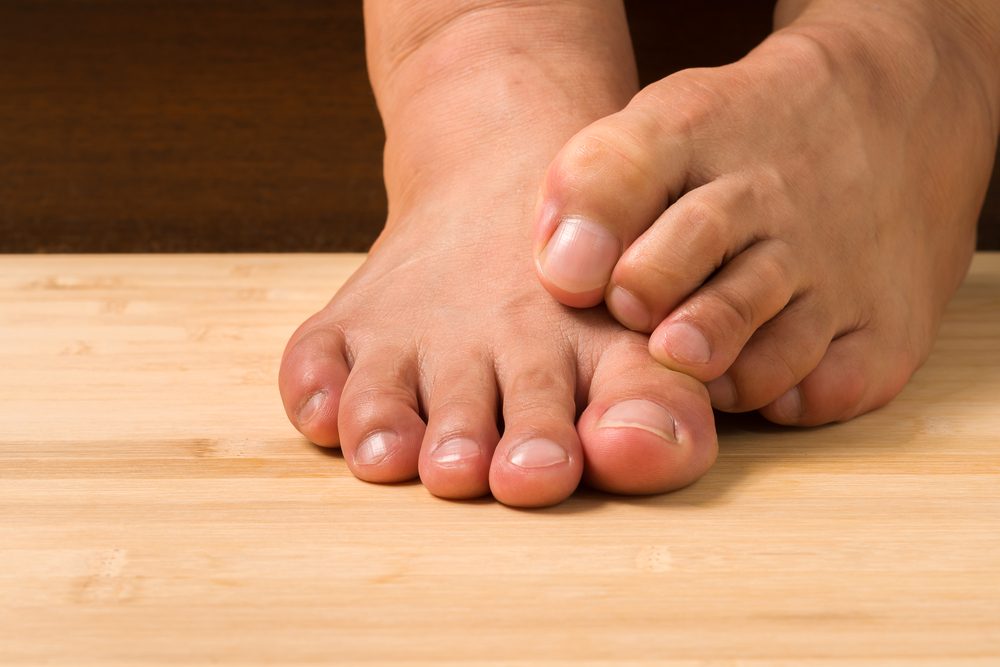
Your feet are itching like crazy
Are you pregnant? A liver disease called cholestasis of pregnancy can cause severe, drive-you-batty itching on your hands and feet. It’s rare, but something to watch out for. While mom isn’t at risk, it can be dangerous for the baby, increasing the likelihood of complications like preterm delivery, says the American Pregnancy Association. Inducing labor may be one option your ob-gyn will consider.
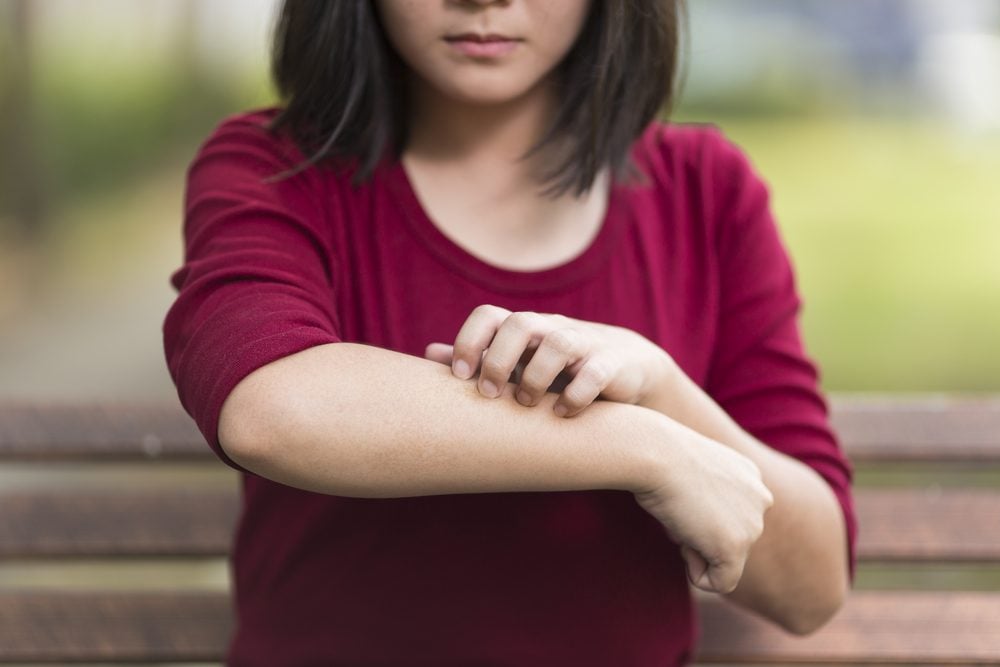
Your skin itches all over
There’s another cause for itchy skin not related to pregnancy—liver damage called cirrhosis. As the American Liver Foundation points out, early damage to the organ often carries zero symptoms. Later, people may experience itching or a yellow cast to their skin, called jaundice. Luckily, after diagnosis, you can prevent further damage by eating healthy and exercising.

You’re bleeding after sex
If your first thought is, well, we haven’t done that in a while, hang on: Bleeding after sex isn’t typical. There are a host of potential causes—ranging from vaginal dryness to cervical polyps—but cervical cancer also falls on that list, according to the Centers for Disease Control and Prevention (CDC). While it may be frightening, it’s important to bring it up with your MD who will consider a range of causes and work to rule out cervical cancer. (Here are 8 silent signs of cervical cancer you should never ignore.)
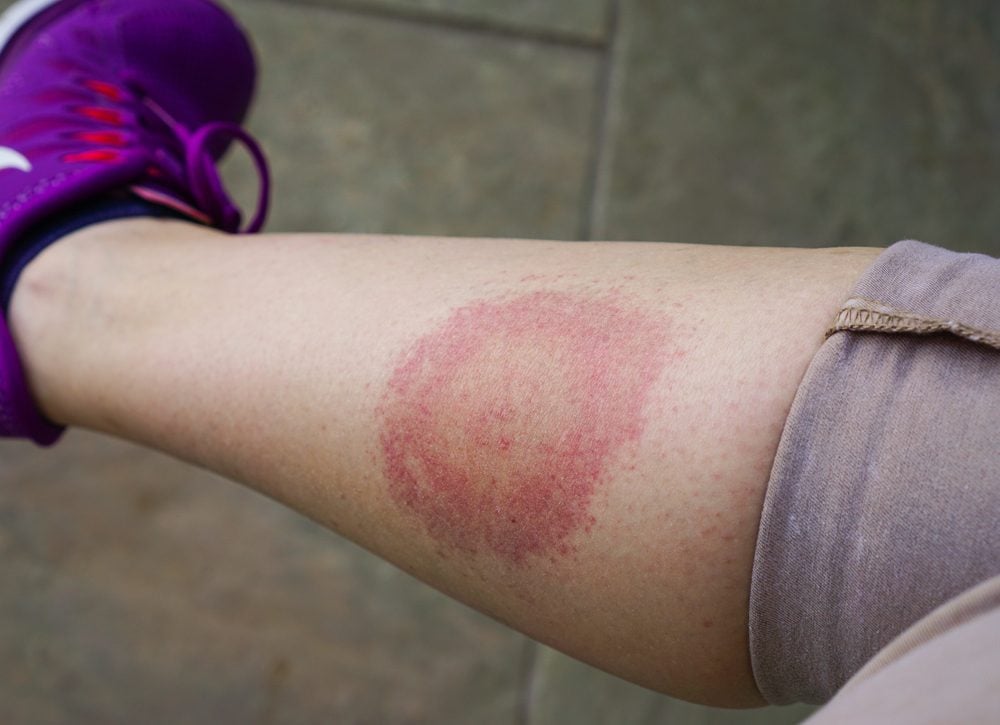
You develop a bulls-eye rash
If you see a red rash in the shape of a bulls-eye popping up on your skin, you should immediately call your doctor. The first thing they’ll check for is Lyme disease. Caused by a tick bite, the disease can also cause more sneaky symptoms like fatigue, lack of focus, and a sore throat. While only 70 to 80 percent of people develop a rash, it may also take on various shapes and colors, like multiple rashes or may even have a blue hue, the CDC points out. If you notice these symptoms or anything out of the ordinary after spending time outside where Lyme-carrying ticks live, talk to your doctor. Here are more Lyme disease symptoms to know about.

You have a red, splotchy rash on your feet
Lyme isn’t the only tick-borne illness you have to watch out for. Rocky Mountain spotted fever, caused by the bacteria Rickettsia rickettsii, can be life-threatening, the CDC warns. You may notice nondescript symptoms like a fever or a headache (which can be chalked up to the flu), but most many patients will also develop a red splotchy rash starting from their ankles and wrists and moving up the body. This is different from a diabetes rash or Lyme disease rash. If you get sick after hiking or camping, call your doctor. (Check out these 9 foolproof tricks to avoid tick-borne illnesses.)

You don’t feel… right
Yep, this is really vague, but if you just feel like “something isn’t right,” get yourself checked out—possibly for a heart attack. Women don’t always get chest pain; instead, they may experience shortness of breath, nausea, fatigue, or body aches (especially in the arm, jaw, or upper back), which is often mistaken for the flu. Here are other sneaky heart attack symptoms women may be ignoring. “With anything out of the ordinary that suddenly pops up without a clear explanation, it doesn’t hurt to have a heart attack in the back of your mind,” says Dr. Sontag. Call your doctor or go to the ER.
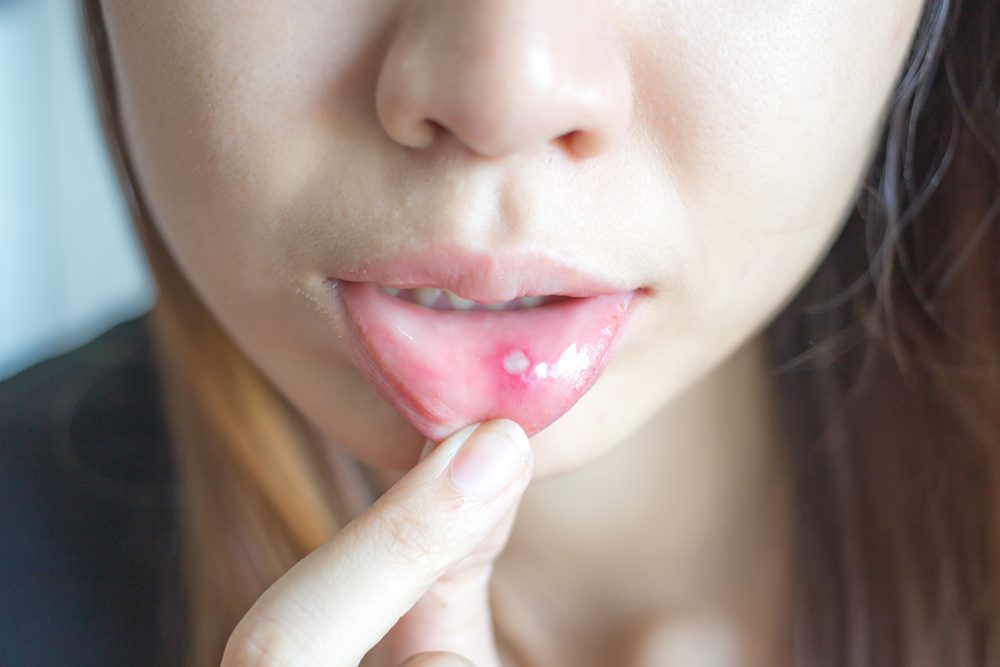
You can’t get rid of those canker sores
With so many symptoms of celiac disease (300!), diagnosis can be difficult. And while GI issues like diarrhea, constipation, and bloating are common, so too are more head-scratching ones like canker sores, reports Beyond Celiac. You may notice these in your cheeks, gums, or lips, and they can be painful. While it’s not a slam dunk for diagnosis, also watch out for other symptoms of celiac, like mood problems, joint pain, and infertility. Here’s how else your body might signal that you need to switch to a gluten-free diet.
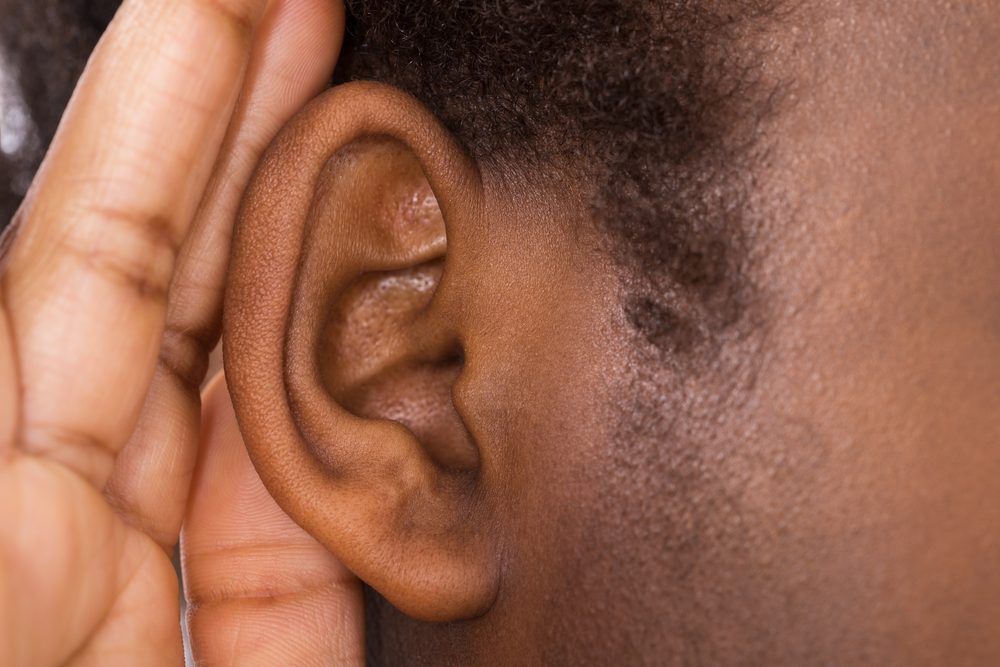
You can’t hear well out of one ear
If you’ve been hearing ringing or sounds are muffled in one ear, you may have an acoustic neuroma, a rare, non-cancerous and often slow-growing tumor, according to the Acoustic Neuroma Association. That’s not to say it’s not dangerous. As it grows, it can cause balance problems and even be life-threatening. If your doctor suspects this, an MRI can confirm the diagnosis.
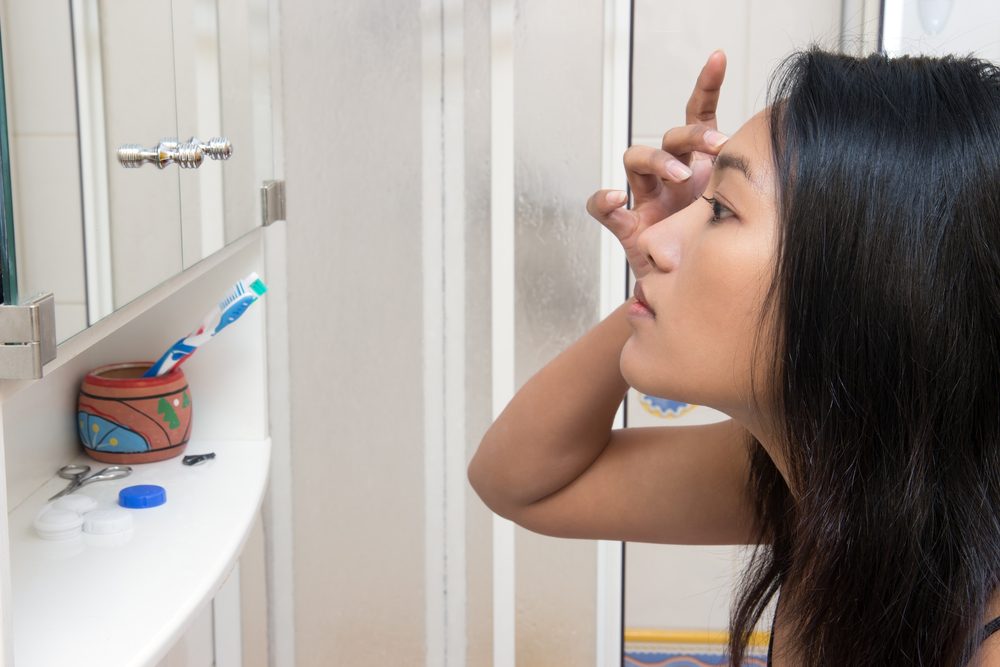
Your eyebrows are thinning
And you thought you just didn’t have to pluck them anymore. Hair loss, including from your eyebrows, can be a sign that your system is working sluggishly thanks to an underactive thyroid (also called hypothyroidism), says Dr. Sontag. Watch out for other symptoms like feeling cold all the time and constipation. Again, your doc will want to run a simple blood test to evaluate the function of your thyroid. Here are some other signs that you should get your thyroid levels checked.
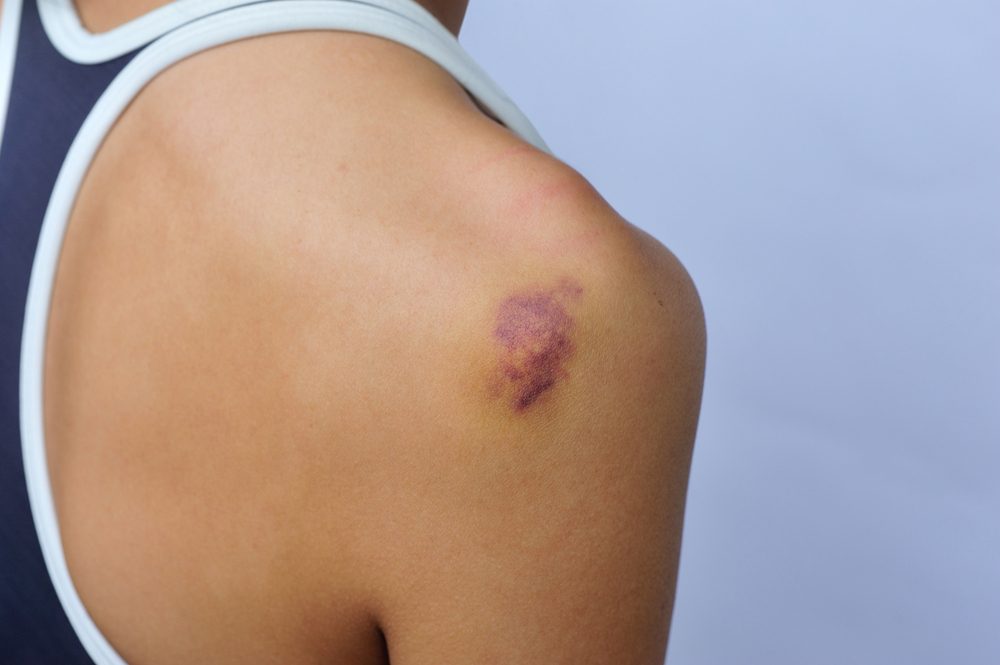
You bruise easily
When you look down, suddenly you see a bunch of discolorations dotting your legs. Is this a leg rash or have you just been extra clumsy? Maybe, but it can also be a silent sign of leukemia. Low blood platelet counts can make you more susceptible to bruises, notes the American Cancer Society. Of course, this doesn’t have to be your first worry, but if your doc suspects a problem, they will check your blood cell count before more invasive testing, like taking a bone marrow sample.
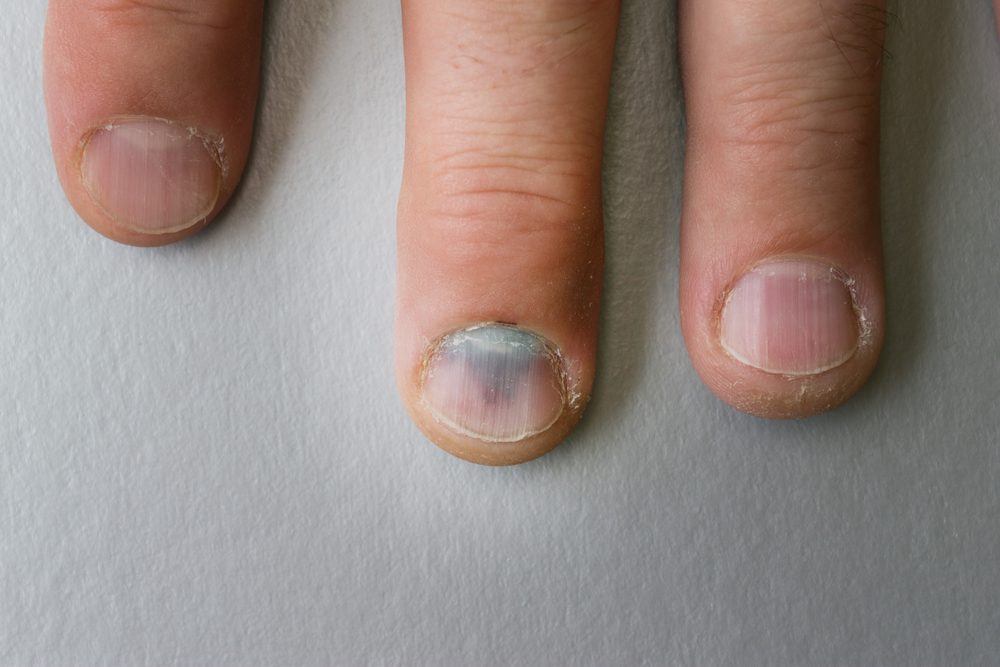
You notice a black streak on your nail
The primary place you likely suspect skin cancer is, well, your skin, but it can also appear on the skin of your nail bed, too. Called acral lentiginous melanoma (ALM), this type of skin cancer can look like a dark streak under your nail, the Aim at Melanoma Foundation notes. If you have this mark on your nail, you should get checked for cancer, although it could have other causes, including bruising from an injury.
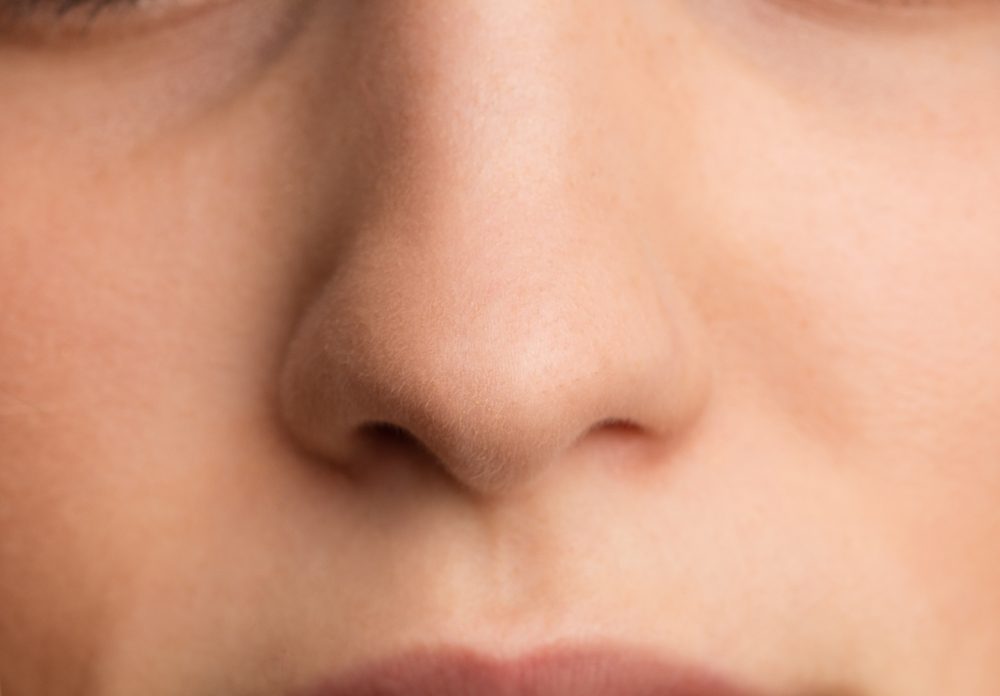
Your sense of smell is dull
If your nose doesn’t perk up to various smells, your ears should perk up to the possibility of an increased odds for Alzheimer’s disease. In a study published in Neurology in 2017, 300 people who already had a parent with the disease (and thus were considered higher risk) were asked to take scratch-and-sniff tests (scents varied from lemon to gasoline). People who weren’t as sharp odor identifiers also had markers of AD. Of course, this isn’t enough to diagnose you. If you’re worried about your risk, particularly if you have a family history of the disease, talk to your doctor. Check out the everyday habits that can help prevent Alzheimer’s disease.

Your child has sudden OCD
If you have a little one who had a round of strep throat and has suddenly developed obsessive-compulsive tendencies, the culprit may be the group A Streptococcus infection. It’s a condition called PANDAS, or “pediatric autoimmune neuropsychiatric disorders associated with streptococcal infections.” Along with OCD, they may also develop anxiety, aggression, or ADHD-like symptoms. It can be a difficult road to diagnosis, but there are several treatment options available, according to the American Academy of Pediatrics. Talk to your child’s pediatrician if you notice an abrupt and alarming change in their behavior and personality. Learn more about early signs of OCD.

You’re sweating through your clothes
Excessive sweating, often on your hands, underarms, or face is called hyperhidrosis. The sweat itself is harmless, but it can also be an indication of an underlying medical condition such as an overactive thyroid or non-Hodgkin lymphoma. Along with the sweat, you may experience fever, weight loss, or shortness of breath, the American Cancer Society points out. If your doctor thinks it may be lymphoma, they’ll order a biopsy of any enlarged lymph nodes to confirm or rule out the diagnosis. Here are 5 medical reasons for your excessive sweat.
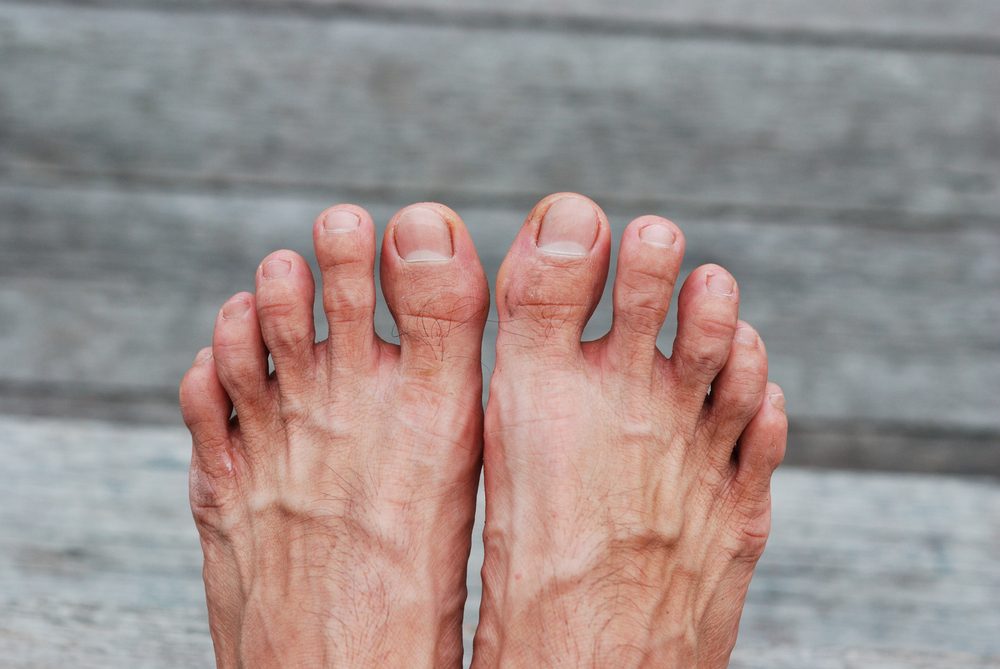
Your toenails aren’t growing
It may be convenient, but if you can’t remember the last time your toenails needed a trim, it’s time to ensure something else isn’t going on. Slow growing toenails or leg hair, or foot wounds that don’t heal as they should, are all signs of peripheral artery disease (PAD), the American Heart Association warns. These are clues that blood flow is having a tough time reaching your lower half because of plaque buildup in these arteries. Tell your doctor about any of these off-kilter symptoms; they may want to check the pulses in your legs to make sure all is functioning as it should.
Next up: Don’t miss these other silent signs your body might be in big trouble.




















